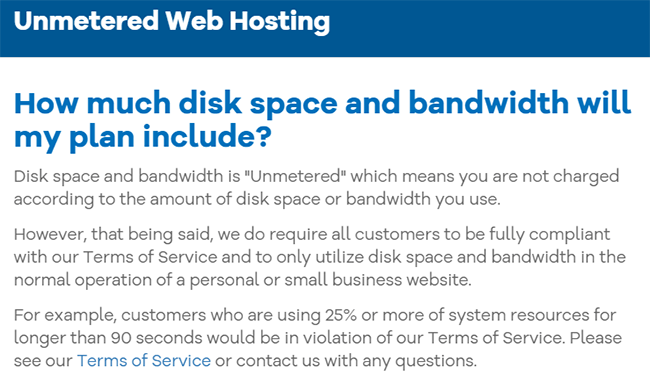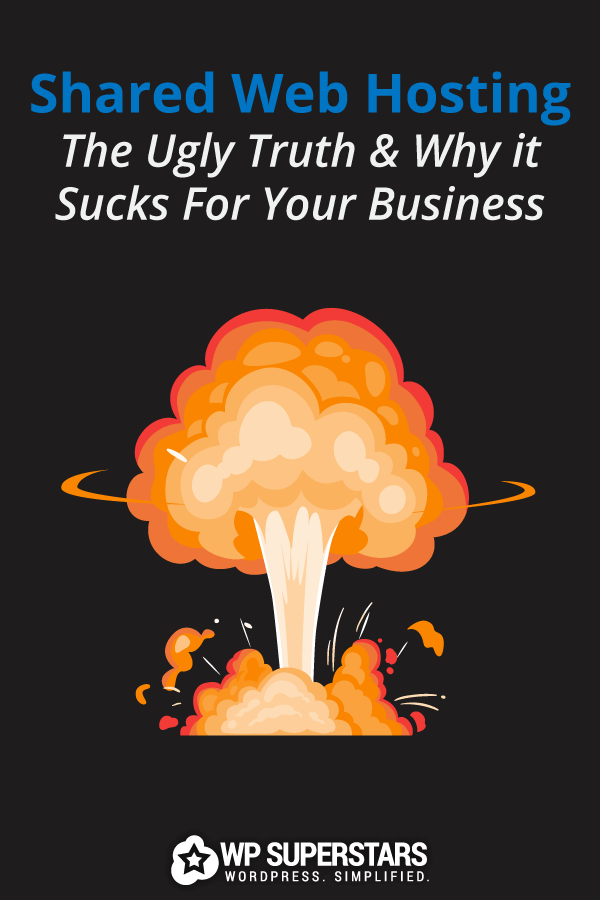It’s Monday morning and you wake up to the virality of your latest promotional Facebook post. Before you start jumping for joy, you grab your phone and realize clicking through your post leads to a broken website.
Your heart drops as you think about the amount of lost traffic, conversions, and revenue. How many people shrugged their shoulders and moved on to someone else’s post!?
Before panic sets in, you head to the admin page of your website to find out what’s going on. Everything looks normal. So, what gives?!
In full-on panic mode, you call your hosting provider. As it turns out, that viral Facebook post led to your website overloading the shared hosting server your site runs on. Your virality sucked up the resources allocated for all the sites on the same server.
Because of this, your site (and others) experience a massive slow-down or crash altogether. While you might think this isn’t fair, this is what could happen if you opt for “economical” web hosting.
Is saving a few dollars a month really worth the hassle, downtime, heartache, and lost revenue? Keep reading to learn more about why shared web hosting sucks—and what you should be using instead.
So, what is shared web hosting?
Shared hosting is a type of web hosting in which one server hosts numerous websites. The server’s resources are split between each website it hosts. Each site on the server has its allocation of:
- CPU (central processing unit)
- RAM (random access memory)
- FTP accounts (file transfer protocol)
- Disk space
- Traffic
- And more
This helps reduce monthly hosting costs (much like renting an apartment) but often ends up causing expensive issues for many growing businesses down the road.
Alternatively, think about the reverse of the example I shared. YOUR website could crash because someone else’s website used up the server’s resources.
No thanks!
The disadvantages of sharing your hosting services
There are hundreds of different types of websites out there. If you want to share your thoughts and blog as a hobby, shared web hosting might be okay. But, you should steer clear if you’re interested in:
- Selling online courses or digital content
- Growing a niche affiliate marketing site
- Building a profitable product review business
- Starting a blog that generates revenue
- Offering consultations and other services
- Starting an eCommerce business
- Or starting any kind of business online
Regardless of the type of digital business you have (or want to have), the limitations of shared web hosting outweigh the economic price tag. To put things in perspective, let’s talk about these disadvantages and what they actually mean.
1. You get what you pay for
Are shared web hosting services cheap? Yes. Are they cheap for a reason? Yes.
Servers can host hundreds (if not thousands) of websites in addition to yours. Each one gets a percentage of the server’s resources. So, you’re paying to share a small piece of something rather than buying the entire thing.
It’s like living in an apartment building. You probably don’t know most of (if any) of your neighbors yet their actions impact your quality of life. With shared hosting, each website on your server can impact your website’s security, up-time, and speed.
Most importantly, you have no idea who you’re sharing with.
2. You share the same resources
On a normal day, there may be plenty of resources for everyone to share. But, you’ve seen what can happen if you (or someone else on your server) has a not-so-normal day.
Going back to apartment living, you have to wait in line to use the washer and dryer. However, the person in front of you has 12 loads to do. So, you have to wait.
Furthermore, you share hallways, walls, the gym, and parking spots with everyone else. But you’re not guaranteed a parking spot or enough quiet time to sneak in two hours of sleep.
With shared hosting, even on normal days, sharing these resources can cause your site to run at a snail’s pace or suffer from periodic moments of down-time. Plus, you have to rely on other sites on your server to save resources for everyone else.
3. You have to rely on other websites’ security
Most website hacks (41%) happen because web hosting security isn’t up to par. Because shared hosting services don’t make a lot of money, their software isn’t regularly updated.
Or, your website may be compromised because another website on your server is using an unsafe or outdated WordPress theme. Since you don’t know who they are, you have no way of knowing how vulnerable your website actually is.
When you live in an apartment, you have to trust that your neighbors aren’t bringing bad people around. Or, you may have to trust them to keep the exterior door closed and locked.
In both cases, your security depends on the actions of those around you.
4. Your customization options and flexibility are limited
Whether you’re starting a blog or growing an eCommerce business the size of Amazon, it’s important to think about the level of web hosting you need today and five years down the line.
Because shared hosting services are low-budget, they often don’t include the flexibility you need to optimize your use of resources. Since you’re sharing with numerous other sites, you all have to follow the same set of rules.
Some of these outdated and rigid areas include:
- PHP – Some hosts offer PHP 7.4 (the most current) while many others do not
- Memory and Caching – Caches help improve site performance but some hosts restrict this because it uses up too many resources
- Apache Modules – Some plugins require specialized modules and many shared hosting providers don’t offer this level of customization
Going further, you don’t have the flexibility to expand your hosting resources as your business grows. You can’t add rooms or change out the carpet in your rented apartment. Each unit has to follow the same set of rules.
In both situations, you’re limited by a set of rules that pertain to a large group of people to keep everyone happy.
5. You sacrifice website speed and performance
If you want to appear on the first page of Google, you’ve probably done your research on technical and on-page SEO. And as you know, site speed is one of over 200 metrics Google uses to rank sites in its results.
Because shared web hosting requires you to share resources, your site speed may suffer as a result. And, if one website is using up most of these resources, you’re going to suffer even more.
Living in an apartment means it takes longer to walk to your car. It takes longer to get out of the parking lot during busy hours. It takes longer to get your laundry done and it takes longer to find a parking spot.
In both situations, your speed depends on the number of people using the same resources at the same time.
6. There’s no such thing as “unlimited”
As a business owner, you have five hundred things running through your mind at any moment. Things like: email marketing, SEO, copywriting, and figuring out how to squeeze in a few hours of sleep.
You don’t have time to worry about whether your website exceeds its allocation of hosting resources. Because of this, many hosting companies started marketing an “unlimited” or “unmetered” plan.
Sharing resources on a limited physical server means there’s no such thing as “unlimited”. There is always going to be a limit on the number of resources available at any given time.
Many companies try to sneak these limitations in the fine print despite marketing an unmetered/unlimited hosting plan. Take HostGator for example:

As a part of their “unmetered” plan, you’re not allowed to use more than 25% of their system resources. If you end up doing so, they have the right to throttle your usage, charge you, or remove your account.
7. It may end up being more expensive over time
Most companies that offer shared hosting services make real money by upselling customers to higher packages. While their low-tier services may work for you in the beginning, you’ll need something better later on.
And that’s where they start making the big bucks. For a while, this upgraded plan will work well for you. Until it doesn’t. And then, they’ll offer you an even better package at a higher price to suit your needs.
They bank on the fact that you will outgrow your current hosting plan.
Additionally, you pay unbelievably low rates for the first contract period. But after that, the price skyrockets without any additional perks, services, or resources.
Many hosting companies hope you’ll suck it up and pay the higher price to avoid the hassle of switching to someone else.
Managed web hosting services – A better hosting solution
For brand new businesses going online, shared web hosting seems too good to be true. And that’s because it usually is. When you’re starting out, a shared plan will work okay. But, as your website continues to grow, you’ll need the flexibility of something better.
Fully managed hosting gives you direct access to your own hosting server which means you don’t have to share or rely on anyone else to follow the rules. You can use it how you need to without worrying about security, site speed, or exceeding your usage.
Check out our favorite WordPress managed hosting companies to find the right plan for you and your business, today!













